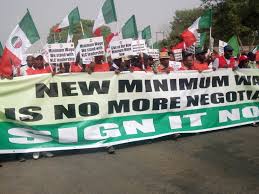THE Federal side of the Tripartite Minimum Wage negotiation like to argue that higher wages would further push up the inflation rate. Ironically, they have no plans for taming inflation even with existing wages because productive activities remain far below reasonable benchmarks.
While they are seemingly sworn against a living wage, they have elevated padding of the national budget to a statecraft, shop for jets for the presidential fleet as a hubby and leads the country to consume, not produce. What about cutting down the cost of governance as promised before the elections?
But I wonder if there is a conspiracy. Where are our activists, social critics, pro-masses economic experts and even religious leaders? Their silence is the reason they attribute the possibility of higher food inflation on better wages as if it is only the workers that go to the market.
I think that their argument is misleading and illogical. Its proponents at Abuja and elsewhere should in fact consider themselves lucky to have a labour union at all to negotiate with. Assuming there is no labour union but some persons that can through their deception, perhaps by now the hungry workers and citizens may have marched out to the streets, with uninvited deviants joining the fray and taking advantage of the situation through violence and looting.
Indeed, hunger and unemployment could push even the sane to self-immolation. By the way, is inflation or the fear of it not better than mass riots and destruction of lives and property by an angry populace? The bitter truth is that apart from the Udoji Award era, the Nigerian State has never seen fair wages.
Out of their hypocrisy, some argue that Labour should be realistic in its demands. Did the labour unions create the hardship but the regime. At any rate, what could make for a more realistic demand than the soaring prices of food in the market? Simply walk down to the market nearest to you and see the reality staring you in the face. You don’t even need labour unions to make demands for you to know the gravity of the danger the country is currently facing.
At the risk of sounding immodest, l dare say the hunger in this country today can make a man eat his own testicles! The regime of hardship would inevitably witness a sharp rise in an outbreak of deadly diseases, suicide cases and deviant behaviour.
In old Soviet Union, Ukrainians were eating their neighbours and human corpses because of acute hunger from Stalin’s collectivist agricultural policy that resulted in acute food shortage.
How more realistic can Labour be than that their members have no food to eat? A hungry man is an angry man, very dangerous because hunger is no joke? Hunger has no patience for the president who always calls for patience. It’s like a goat pushed to the wall; it is fighting back. Needless to say, matters related to minimum wage is in the Exclusive list, thus it can only be legislated upon by the National Assembly and not State Assemblies.
Another argument which comes across as quite conceited is that the public service labour force in both federal, states and local government levels represent only an insignificant percentage of the larger Nigerian population, for which reason, they argue that Labour is selfish for pushing for wage increase for only workers without any consideration for the rest of the suffering masses. This argument is preposterous and negates the fact that minimum wage is a function of the law as enunciated in the Minimum Wage Act which provides for a review of wages every five years.
So, anything to the contrary by the federal government would amount to a breach of the law.
As a matter of fact, labour unions have no constitutional obligation to cater for the security and welfare of the entire nation. That is the primary function of government as espoused in the Nigerian Constitution. Needless to add that matters related to fixing of the national minimum wage falls under the Exclusive list in the constitution, thus it can only be legislated upon by the National Assembly and not State Assemblies.
Come to think of it, why is it that whenever government policy from Abuja backfires, it is the masses and poorly paid workers that are told to bear the brunt and make sacrifices. This elitist culture of sacrificing the underdog rather than protecting them showed itself recently when the immediate past president advocated population control as part of the solution to the hardship that was created right under his nose.
Do they think that the poor are more attuned to sacrifice, so the system finds it very convenient push the burden of sacrifice to the common man while the ‘non-common men ‘jollificates’. After all, in some cultures, it is said that when the king dies, his servant is buried with him to continue the servitude on the other side! But if workers and hungry citizens are treated like destitutes in this manner, for how long can they enjoy this patience of the masses without paying dearly for it?
It must be emphasized here that the idea of minimum wage is not circumscribed to only workers’ welfare but is meant to protect all households, all of which comprise at one point or another, the employer, the employee, the unemployed, retirees, children and the elderly. Simply put, if you are a worker, you have a family to cater for and whatever wage you earn is not for you alone. To that extent, whether or not you are a civil servant is immaterial.
So, the argument that seeks to pitch the unions and public service workers against the rest of the population is divisive and parochial and only exhumes the old corpse of ‘divide and rule’ reminiscent of British imperialism. What the rule of law demands therefore is that the federal government must carry out a review of the national minimum wage every five years in line with the constitution.


